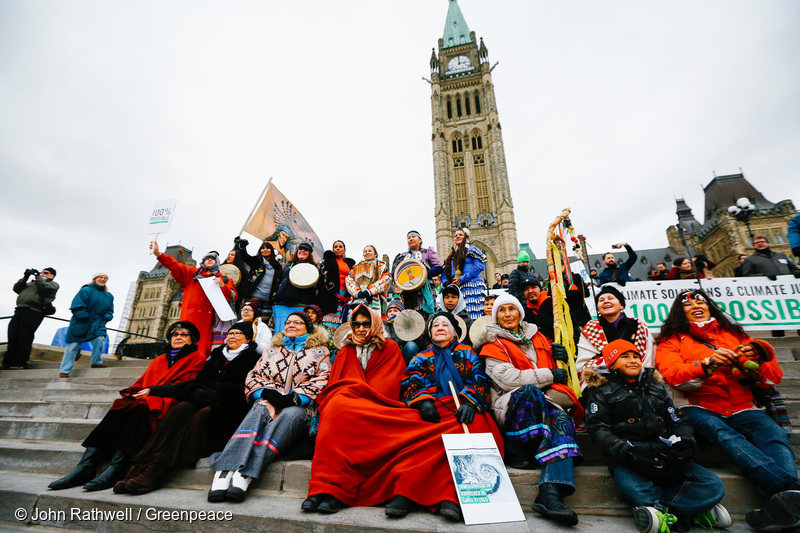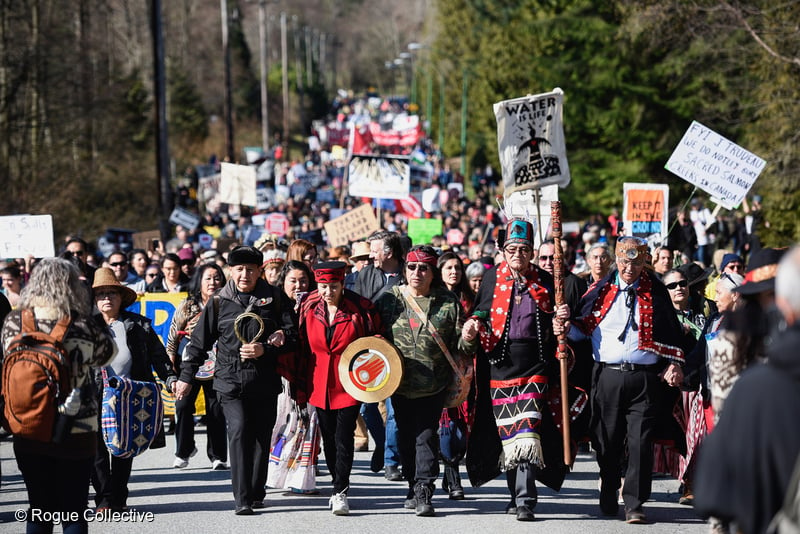UPDATE: The City of Toronto’s Environment and Infrastructure Committee passed the motion on pursuing compensation for the cost of climate change to the city. In response, Greenpeace Canada Staff Lawyer Priyanka Vittal said:
“The powerful testimonies delivered here today by Toronto youth, lawyers, residents and environmental experts leave no doubt that Torontonians want to see stronger climate action from City Hall. We’re happy to see Council take this first step in gathering the information needed to make sure that regular people aren’t on the hook for mounting climate-related costs. Protecting residents while holding polluters to account for their role in creating the climate crisis must be at the foundation of a just transition away from fossil fuels.”
See the press release from this morning below for more information.
—
FOR IMMEDIATE RELEASE
25 APRIL 2019

Police boats rescue travellers on the GO Train in Toronto during the 2013 floods.
TORONTO — Toronto residents and organizations held a press conference this morning to announce their support for a motion before the City of Toronto to explore holding big polluters accountable for their fair share of the costs of climate change.
Greenpeace Canada’s “6ix Reasons to Sue” campaign” supports the motion, introduced by Councillor Mike Layton last month. Over 700 Toronto residents have emailed their councillor to support the motion. It is also so far supported by the Canadian Association of Physicians for the Environment, Toronto Environmental Alliance, The Leap and Climate Fast. Several Toronto residents will be making deputations in support for the motion at today’s meeting of the Environment & Infrastructure Committee.
Speakers at today’s press conference included the following:
- Mike Layton, Toronto City Councillor for Ward 11 University-Rosedale;
- Priyanka Vittal, Greenpeace Canada Staff Lawyer;
- Rommel Bellosillo, Toronto resident, Greenpeace Canada volunteer; and
- Heather Marshall, Campaign Director of the Toronto Environmental Alliance.
Extreme weather hitting Toronto has cost hundreds of millions of dollars — the cost of the 2013 floods alone reached $940 million (about $65 million of which were capital and operating costs to the city). With more extreme weather on the way, Toronto faces rising repair costs and needed investments in resilience to safeguard city infrastructure and protect Torontonians’ health and safety.
The campaign led by Greenpeace Canada argues that fossil fuel producers should pay their fair share of these costs because they have known for 50 years that their products would contribute to climate change but took steps to mislead the public, much like the tobacco industry did with cigarettes. Their choices delayed action and exposed cities like Toronto to significant climate impacts and costs.
More than a dozen US cities, states and counties (including New York and San Francisco) and 21 B.C. municipalities have taken action to hold fossil fuel producers accountable for their share of climate costs.
Quotes
Mike Layton, Toronto City Councillor for Ward 11 University-Rosedale, said: “Cities are the ones that are on the front lines when it comes to dealing with the costs of climate change. We are the ones that are going to have to pay for the increased frequency and severity of storms. Ignoring this problem won’t make it go away, so we need to know what those costs are and explore all options for paying them.”
Priyanka Vittal, Toronto-based Staff Lawyer for Greenpeace Canada, said: “Our legal system has tools for holding companies to account for misleading the public about the risks of their products or the availability of safer alternatives. Just like in the tobacco precedent, big polluters funnelled millions into decades-long campaigns to cast doubt on climate science in order to delay policies that would reduce demand for their products. That record of deception and delay has increased the damages and costs we are experiencing now, and so these big polluters should pay their fair share of Toronto’s rapidly rising climate costs.”
Rommel Bellosillo, a Toronto resident, said: “Climate change has greatly affected all of us, no matter where we live. As a new Canadian, I’ve seen major flooding damage Toronto homes, our transit system and other infrastructure. I’ve also seen it first-hand in my home country of the Philippines, where thousands of people have lost their livelihoods and lives to hurricanes and typhoons that are getting stronger and stronger. In light of these losses, I believe holding big polluters accountable is worth exploring.”
Heather Marshall, Campaigns Director of the Toronto Environmental Alliance said: “Toronto’s flood waters and temperatures are rising year after year, and so are the costs of climate change. This is no longer just a future challenge to prepare for, it is today’s problem to respond to. City Council needs to do more to get ahead of known climate risks and build strong infrastructure to keep residents safe. This is going to require significant financial investments in both physical infrastructure and human resources, far more than what’s in the City Budget. To secure the money needed to build a resilient climate-ready city, Toronto City Council should leave no stone unturned, especially fair revenue tools that target the largest sources of pollution. The funds raised can be directly invested in solutions that benefit Toronto’s most vulnerable communities.”
Kim Perrotta, Executive Director of Canadian Association of Physicians for the Environment said: “We are quickly approaching a level of global warming that could make the world uninhabitable for our children. The prestigious medical journal, The Lancet, and the World Health Organization, have identified climate change as the greatest public health threat of the 21st century. We are no longer talking about health threats in some distant future or in some distant land. We are already seeing the impacts of climate change in Ontario. Last summer, on 21 days, temperatures at the Pearson Airport exceeded 30 degrees Celsius, a temperature that can be deadly for the elderly and for those with pre-existing health conditions. That’s nearly twice as many days as the 30-year average that ended in 2005 — and just half as many days as are expected by 2050 if current rates of emissions continue.”
Key facts
- The August 2018 flood in Toronto cost $80 million in insured damages.
- The 2017 flood of the Toronto Islands cost $7.4 million in repairs.
- Research commissioned by the Insurance Bureau of Canada (IBC) warns that extreme weather costs are rising. The IBC says a significant protection gap exists: for every $1 paid by insurers, governments pay $3 to repair public infrastructure damaged by severe weather.
- The rising costs of floods is a financial challenge for Canadian households, 1.7 million of which (19% of the population) are at risk of ravine/overland flooding.
- The average flooded basement costs about $40,000. Flooding personally costs Canadians’ $600 million every year and can impact their businesses, employment, and mental health.
- Canada is vulnerable to climate impacts as is warming at twice the rate of the rest of the world.
- Earlier this month, Ontario’s Ford government cut Conservation Authority Flood Forecasting & Natural Hazards Management funding by 50%.
- The 25 biggest fossil fuel producers are responsible for the majority of the world’s human-caused greenhouse gas pollution since 1988. These companies should pay their fair share of the costs.
-30-
Briefing note: 6ix Reasons To Sue
For more information, please contact:
Jesse Firempong, Communications Officer, Greenpeace Canada
[email protected]; +1 778-996-6549
Keith Stewart, Senior Energy Strategist, Greenpeace Canada
+1 416-659-0294




